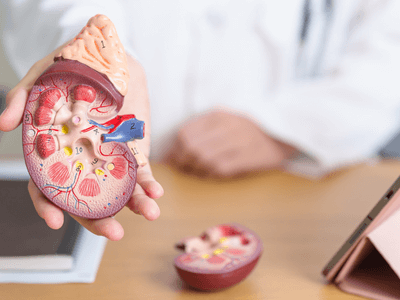Florida’s high temperatures and humidity can place significant stress on the body, particularly the adrenal glands. The adrenal glands, located above the kidneys, produce essential hormones such as cortisol and aldosterone that help regulate stress, metabolism, blood pressure, and electrolyte balance. Chronic exposure to heat can lead to adrenal fatigue, dehydration, and imbalances in these crucial hormones, affecting overall health. In this blog, the experts at Tampa Bay Endocrine explore how Florida’s climate influences adrenal function and what you can do to protect your health.
Understanding the Adrenal Glands’ Role in Heat Regulation
The adrenal glands play a vital role in helping the body adapt to environmental stressors, including extreme heat. Two primary hormones—cortisol and aldosterone—are particularly important in maintaining stability during prolonged exposure to high temperatures.
- Cortisol: Helps manage stress by regulating glucose levels and reducing inflammation.
- Aldosterone: Regulates sodium and potassium levels, ensuring proper hydration and blood pressure control.
When the body is exposed to excessive heat, the adrenal glands work harder to maintain electrolyte balance and hydration. However, prolonged stress from heat exposure can lead to adrenal fatigue, resulting in symptoms like dizziness, fatigue, low blood pressure, and electrolyte imbalances.
Effects of Florida’s Heat on Adrenal Function
1. Dehydration and Electrolyte Imbalances
Florida’s intense heat increases sweating, leading to dehydration and loss of essential electrolytes like sodium, potassium, and magnesium. The adrenal glands produce aldosterone to retain sodium and maintain blood pressure. However, chronic dehydration forces the adrenals to work harder, potentially leading to adrenal fatigue and symptoms such as:
- Lightheadedness or dizziness
- Muscle cramps
- Low blood pressure
- Increased thirst
2. Heat Stress and Increased Cortisol Production
Exposure to high temperatures triggers a stress response in the body, leading to an increase in cortisol production. While cortisol helps manage heat-related stress, chronic elevation of this hormone can contribute to:
- Fatigue and burnout
- Weakened immune function
- Blood sugar imbalances
- Increased inflammation
If cortisol levels become dysregulated due to prolonged heat exposure, individuals may experience symptoms of adrenal dysfunction, including exhaustion and difficulty managing stress.
3. Impact on Blood Pressure Regulation
Aldosterone, one of the key adrenal hormones, plays a crucial role in regulating blood pressure by balancing sodium and potassium levels. When the body loses too much sodium through sweat, aldosterone production increases to compensate. However, excessive sweating and chronic heat exposure can lead to:
- Persistent low blood pressure (hypotension)
- Dizziness and fainting spells
- Increased heart rate (as the body tries to compensate for low blood pressure)
People with pre-existing adrenal conditions, such as Addison’s disease, need to be particularly cautious in Florida’s heat, as they may be more susceptible to adrenal crises.
Who Is Most at Risk?
While heat can affect everyone, some individuals are more vulnerable to its impact on adrenal health, including:
- People with adrenal insufficiency (such as Addison’s disease)
- Individuals with chronic stress or adrenal fatigue
- Elderly adults, who may have reduced adrenal function
- Athletes or outdoor workers, who experience prolonged sun exposure and excessive sweating
- People with existing heart conditions, as heat-related blood pressure fluctuations can be dangerous
How to Support Adrenal Health in Florida’s Heat
1. Stay Hydrated and Maintain Electrolyte Balance
- Drink plenty of water throughout the day, even if you don’t feel thirsty.
- Include electrolyte-rich foods such as bananas, avocados, and leafy greens in your diet.
- Consider electrolyte-replenishing drinks (without excessive sugar) if sweating heavily.
2. Manage Stress and Support Cortisol Levels
- Practice stress-reducing activities such as meditation, yoga, or deep breathing.
- Prioritize rest and avoid overexertion in high temperatures.
- Incorporate adaptogenic herbs, such as ashwagandha and rhodiola, which support adrenal function.
3. Avoid Overexposure to Heat
- Take breaks in shaded or air-conditioned areas when outdoors.
- Wear loose, light-colored clothing to help regulate body temperature.
- Exercise in the early morning or late evening to avoid peak heat hours.
4. Eat a Balanced Diet to Support Adrenal Function
- Consume whole foods rich in vitamin C, B vitamins, and magnesium to support adrenal health.
- Reduce processed foods and excess sugar, which can contribute to cortisol imbalances.
- Include healthy fats, such as nuts, seeds, and olive oil, to support hormone production.
5. Monitor Blood Pressure and Symptoms
- If you experience persistent dizziness, fatigue, or blood pressure fluctuations, consult a healthcare provider.
- Individuals with adrenal insufficiency should discuss heat management strategies with their endocrinologist.
When to Seek Medical Help
If you experience severe symptoms of heat exhaustion, such as confusion, rapid heartbeat, or extreme weakness, seek immediate medical attention. Additionally, if you have an existing adrenal condition and notice persistent fatigue, low blood pressure, or electrolyte imbalances, schedule an appointment with an endocrinologist for evaluation and management.
Conclusion
The Florida heat can put extra strain on the adrenal glands, leading to potential imbalances in hydration, blood pressure, and cortisol regulation. Staying hydrated, managing stress, and monitoring adrenal health are crucial to preventing adrenal fatigue and related complications. If you have concerns about your adrenal health, consult the specialists at Florida Endocrinology and Diabetes Center for expert guidance and personalized care.

